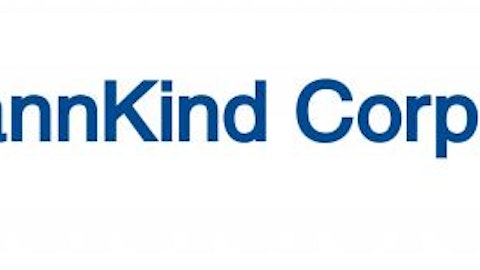In clinical studies, Incivek delivered a sustained virologic response (SVR) (i.e., non-detectable levels of the hepatitis-C virus) in 79% of patients treated with the drug after 24 weeks. Based on its varying studies, this was 20%-45% better than the standard of care at the time. Unfortunately, Incivek is a drug designed to be administered with interferon, which can cause flu-like symptoms in patients for up to 48 weeks.
This is where Gilead Sciences, Inc. (NASDAQ:GILD) and AbbVie Inc (NYSE:ABBV) saw their opportunity to not just knock on the door, but bust down the IV-barriers to hepatitis-C therapy by introducing an all-oral therapy.
Gilead’s promising hep-C compound, sofosbuvir, proved far superior to the placebo in four late-stage trials, delivering an impressive 90% SVR in genotype 1 patients, while also outperforming the placebo in less common forms of the hep-C genotype. Sofosbuvir is currently under review by the FDA and could receive approval before the year is out. Peak sales estimates of the drug are calling for sales to reach approximately $6 billion.
AbbVie Inc (NYSE:ABBV) also has an equally impressive hep-C drug in the works. Its trio of drugs delivered a 97% SVR in mid-stage trials (its patient subset was much larger than Gilead’s mid-stage trial which produced a 100% SVR), and could prove just as effective, if not more so, than Gilead Sciences, Inc. (NASDAQ:GILD)’s sofosbuvir.
With the undeniable truth that oral therapies are soon coming to market, patients and even physicians are holding out for these treatments that offer far fewer, and much less serious, side effects. In Vertex Pharmaceuticals Incorporated (NASDAQ:VRTX)’s most recent quarterly results, released at the end of July, it reported that Incivek sales plummeted 52.4% from the year-ago period to just $156 million, and fell 24% just from the previous quarter!
Source: Vertex Pharmaceuticals 10-Q’s.
Based on its current rate of contraction, and the expectation that sofosbuvir and AbbVie’s trio could make it to market within the next 12 months, Incivek could, in my best estimate, see another 50% of its sales evaporate by the end of 2014.
Not all hope is lost
The good news for Vertex Pharmaceuticals Incorporated (NASDAQ:VRTX) shareholders is that all hope isn’t lost. Sales for Incivek may be dropping at an incredible rate, but expectations for Kalydeco, its cystic fibrosis drug, and its remaining CF pipeline, are soaring. In the same quarter that Incivek sales widely missed estimates, Vertex boosted its annual sales outlook for Kalydeco.
The key takeaway here for you as an investor in the biotechnology sector is that complacency is punished in almost every instance. A biotech investor needs to understand the possible competitors to new drugs in terms of what’s on the horizon, and how far out the market approval of its peers might be. Knowing your competition is an integral component of investing in biotech. Luckily for current shareholders, Kalydeco and Vertex Pharmaceuticals Incorporated (NASDAQ:VRTX)’s cystic fibrosis pipeline is saving their behinds… but others may not be so lucky.
The article The Rise and Fall of the Fastest Growing Drug in the World originally appeared on Fool.com and is written by Sean Williams.
Fool contributor Sean Williams has no material interest in any companies mentioned in this article. You can follow him on CAPS under the screen name TMFUltraLong, track every pick he makes under the screen name TrackUltraLong, and check him out on Twitter, where he goes by the handle @TMFUltraLong.The Motley Fool owns shares of Dendreon and recommends Gilead Sciences and Vertex Pharmaceuticals.
Copyright © 1995 – 2013 The Motley Fool, LLC. All rights reserved. The Motley Fool has a disclosure policy.





